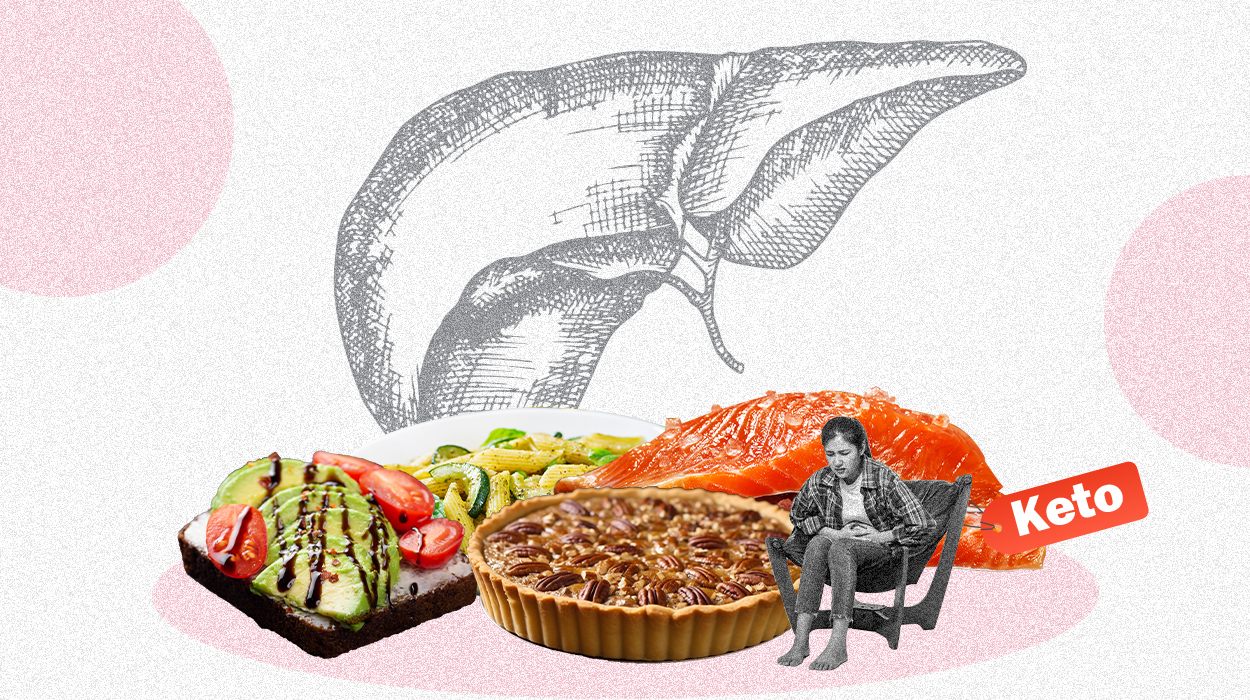 Expert's opinion
Expert's opinion
Expert's opinion
The article is a subjective view on this topic written by writers specializing in medical writing.
It may reflect on a personal journey surrounding struggles with an illness or medical condition, involve product comparisons, diet considerations, or other health-related opinions.
Although the view is entirely that of the writer, it is based on academic experiences and scientific research they have conducted; it is fact-checked by a team of degreed medical experts, and validated by sources attached to the article.
The numbers in parenthesis (1,2,3) will take you to clickable links to related scientific papers.
Is Keto Good For Fatty Liver Disease? How To Reduce Liver Fat In 2024?

Fatty liver disease is exactly what it sounds like disease in which extra builds up in the liver. In the early stages, the disease, also called hepatic steatosis, often causes no symptoms.
However, if the condition continues to worsen, it can progress to steatohepatitis, which can cause scarring of the liver. If the scarring is widespread or severe, it can then result in cirrhosis, which often requires a liver transplant to treat.
There are two causes of fatty liver disease: alcohol abuse and lifestyle factors. In the latter case, nonalcoholic fatty liver disease (NAFLD) is often due to overweight, obesity, and diet. In this regard, changing the diet can prevent NAFLD from progressing or even reverse it.
The keto diet, which is popular due to its ability to facilitate weight loss, has been shown to be effective[1] in treating NAFLD.
Is Keto Good For Fatty Liver?
Obesity and poor diets result in NAFLD, which is caused by high levels of blood cholesterol and unhealthy levels of triglycerides (too high or too low depending on the type). These factors cause too much fat to accumulate in the liver. However, a ketogenic diet can help.
Keto and fatty liver, keto diets induce the body to enter ketosis, in which it burns fat for energy instead of glucose, thus necessitating the utilization of fat stored in the liver. The result is decreased fat accumulation, thereby reducing the severity of or even reversing NAFLD.
What Is Fatty Liver Disease?
Fatty liver disease is a condition that emerges when the liver stores more fat than it needs to. It comes in two varieties: the first is alcoholic fatty liver disease, which is caused by habitual abuse of alcohol; the second is nonalcoholic fatty liver disease (NAFLD), which is caused by excess weight and/or a poor diet.
Sometimes, hereditary factors causing high cholesterol or triglycerides are to blame. With excess fat accumulation in the liver, the condition can progress to steatohepatitis, an inflammatory condition, and even cirrhosis.
Features Of Nonalcoholic Fatty Liver Disease (NAFLD)
As noted, the key feature of NAFLD is the accumulation of excess fat in the liver. Early in the disease process, there are often no symptoms, although there is sometimes fatigue or very mild pain.
The most dangerous aspect of nonalcoholic fatty liver disease is its propensity to progress to more serious conditions if left untreated.
Nonalcoholic steatohepatitis (NASH), which can cause scarring of liver tissue, can cause permanent damage to the liver. Most distressingly, developing NASH increases the likelihood not only of cirrhosis but also of hepatocellular carcinoma, a type of liver cancer.
Causes Of Nonalcoholic Fatty Liver Disease (NAFLD)
While some cases of NAFLD could have genetic factors, most cases of NAFLD are caused by lifestyle factors, primarily diet.
- Ingesting too much sugar: Sugar is increasingly being recognized as one of the most potentially dangerous substances that most of us eat on a regular basis. Whereas Americans eat an average of 100 grams of sugar per day, more than around 30 mg per day is unhealthy. By increasing the likelihood of weight gain and obesity, sugar is a major culprit causing NAFLD.
- Consuming too many calories: Sugar is not the only component of food that causes weight gain, however. Too many calories overall will undoubtedly cause extra weight too, so not controlling one’s overall calorie intake[2] can also result in NAFLD. If you are eating more than 2,000 calories a day as a woman or 2,500 calories as a man, you are increasing your risk.
- Eating the wrong fats: In the same way that your blood cholesterol includes a good number that you want high (HDL) and a bad number that you want low (LDL), there are good and bad fats[3] that go into what you eat. You’re probably aware that you should avoid overconsumption of trans fats and saturated fats. Polyunsaturated fat, also called omega-6 fatty acid, while fine in small amounts, is dangerous in larger amounts, particularly in people who already have NAFLD. In these people, these fats can increase the likelihood of progression to NASH.
How To Detect NAFLD
Since there is often a lack of symptoms before the disease progresses to a more serious condition, NAFLD is typically diagnosed when routine blood testing reveals elevated liver enzymes.
Imaging studies, typically using CT or MRI, and the amount of alcohol consumed regularly confirm the diagnosis[4].
How The Ketogenic Diet Can Help NAFLD?
- Lower insulin levels: Because of its association with obesity, NAFLD is also closely associated with type 2 diabetes. Diabetes doesn’t happen all at once; it is preceded by insulin resistance, in which the cells of the body no longer respond to insulin as much because they have acclimated to high insulin levels. To prevent insulin resistance from emerging, it is important to keep insulin levels low. Any very low-carb diet will achieve this goal, including keto.
- Reduce liver fat: Since liver fat is the cause of NAFLD, reducing fat can help one recover from or reverse the disease. Keto is well constituted to achieve this goal because it forces the body into ketosis, the state in which it burns ketone bodies produced by fat in the liver to provide energy. With changes in diet, keto can burn off this fat more efficiently.
- Promote weight loss: Weight loss is really the linchpin to treating NAFLD[5], and keto is highly effective in taking off weight. Because of its focus on burning fat, not only does keto accelerate weight loss but it can also reduce body fat overall.
The Guidelines For Keto Diet For Fatty Liver
Incorporate Liver Healing Foods
- Nuts: Nuts are one of the best sources of healthy fats in the keto diet. In particular, peanuts and walnuts have been shown to improve liver factors and decrease the risk[6] of NAFLD. The benefits of walnuts also include facilitating weight loss and more.
- Olive oil: Olive oil is one of the healthiest cooking oils available, thanks to its high concentration of monounsaturated fats. It has also been shown to decrease fat accumulation] in the liver, so it’s a good bet for a diet seeking to help those with NAFLD. Olive oil benefits also include boosting heart health.
- Avocado: A staple of the keto diet, and often considered a superfood, avocados are loaded with healthy oils. Moreover, like the other foods listed here, it has been shown to be helpful in ameliorating the effects of NAFLD.
Take Liver Healing Supplements
- Spirulina: A variety of blue-green algae, spirulina has been a popular health food for decades. Numerous claims have been made about its benefits, not all of them proven, but it has shown liver-protecting effects in lab animals. Proceed with caution, however, since overuse has also been linked to liver damage.
- Milk thistle: Milk thistle, the common name for Silybum marianum, is a flowering plant used in indigenous medicine for centuries. Studies have shown that it is effective in improving liver function and even increasing survival in people with cirrhosis and liver cancer. There are many milk thistle supplements available on the market.
- Licorice root extract: More famous as an ingredient in candy, licorice root also has been used as a folk remedy. However, science has also demonstrated[7] hepatoprotective effects of moderate licorice root extract intake.
Modify Keto For Liver Health
The mere fact that keto reduces body fat and helps in weight loss makes it good for liver health. However, there are certain foods in the ketogenic diet that should be avoided if one has NAFLD.
Keto, despite its high-fat content, is suitable for NAFLD if you steer clear of saturated and polyunsaturated fats. Plus, it makes it simple to skip sweets and processed sugars due to its low-carb content
Sample Keto Diet Plan For Fatty Liver
Day 1
- Breakfast: Keto-friendly granola or cereal with low-fat milk, and coffee (considered by some a superfood for the liver)
- Lunch: Spinach and feta wrap with whole-grain high-fiber tortilla
- Dinner: Grilled salmon and cauliflower rice
- Dessert: Avocado brownie
Day 2
- Breakfast: Avocado toast with smoked salmon, coffee
- Lunch: Grilled tuna with asparagus
- Dinner: Zucchini pasta with avocado walnut pesto
- Dessert: Pecan pie with almond flour crust
Conclusion
A diagnosis of NAFLD is concerning but not the end of the world. With proper care, diet, and a keto diet, you can potentially treat and even reverse liver disease before it becomes permanent. Keto offers healthy foods and oils, along with a low-carb plan, to support liver health.
Frequently Asked Questions
Fatty liver disease is a condition characterized by high deposition of fat in the liver, which can lead to steatohepatitis, a form of inflammation; cirrhosis; and even liver cancer.
Yes, there is consistent evidence that a keto diet can help to halt the progression of fatty liver disease to more serious forms of liver disease. It might even reverse the damage done by fatty liver disease.
In addition to limiting the intake of trans fats and saturated fats, people with fatty liver disease should limit their intake of polyunsaturated fats (also known as omega-6 fatty acids). Instead, they should use fats that are high in monounsaturated fats, like olive oil.
+ 7 sources
Health Canal avoids using tertiary references. We have strict sourcing guidelines and rely on peer-reviewed studies, academic researches from medical associations and institutions. To ensure the accuracy of articles in Health Canal, you can read more about the editorial process here
- Foster, G.D., Wyatt, H.R., Hill, J.O., McGuckin, B.G., Brill, C., B. Selma Mohammed, Philippe Szapary, Rader, D.J., Edman, J.S. and Klein, S. (2003). A Randomized Trial of a Low-Carbohydrate Diet for Obesity. [online] 348(21), pp.2082–2090. doi:https://doi.org/10.1056/nejmoa022207.
- Wehmeyer, M.H., Birgit-Christiane Zyriax, Jagemann, B., Roth, E., Windler, E., Schulze, J., Lohse, A.W. and Johannes Kluwe (2016). Nonalcoholic fatty liver disease is associated with excessive calorie intake rather than a distinctive dietary pattern. [online] 95(23), pp.e3887–e3887. doi:https://doi.org/10.1097/md.0000000000003887.
- admin (2014). Effect of a high monounsaturated vs high polyunsaturated fat hypocaloric diets in nonalcoholic fatty liver disease. [online] European Review. Available at: https://www.europeanreview.org/article/7212
- Laurent Castera, Mireen Friedrich-Rust and Rohit Loomba (2019). Noninvasive Assessment of Liver Disease in Patients With Nonalcoholic Fatty Liver Disease. [online] 156(5), pp.1264-1281.e4. doi:https://doi.org/10.1053/j.gastro.2018.12.036.
- Brunner, K.T., Henneberg, C.J., Wilechansky, R.M. and Long, M.T. (2019). Nonalcoholic Fatty Liver Disease and Obesity Treatment. [online] 8(3), pp.220–228. doi:https://doi.org/10.1007/s13679-019-00345-1.
- María José Torres, Giorgia Bodini, Furnari, M., Marabotto, E., Patrizia Zentilin and Giannini, E.G. (2020). Nuts and Non-Alcoholic Fatty Liver Disease: Are Nuts Safe for Patients with Fatty Liver Disease? [online] 12(11), pp.3363–3363. doi:https://doi.org/10.3390/nu12113363.
- Pouya Rostamizadeh, Kazem, M., Zohreh Ghaem Far, Pegah Ahmadijoo, Trias Mahmudiono, Dmitry Bokov, Al-Saikhan, F.I., Behrooz Jannat and Mazloom, Z. (2022). Effects of licorice root supplementation on liver enzymes, hepatic steatosis, metabolic and oxidative stress parameters in women with nonalcoholic fatty liver disease: A randomized double‐blind clinical trial. [online] 36(10), pp.3949–3956. doi:https://doi.org/10.1002/ptr.7543.



